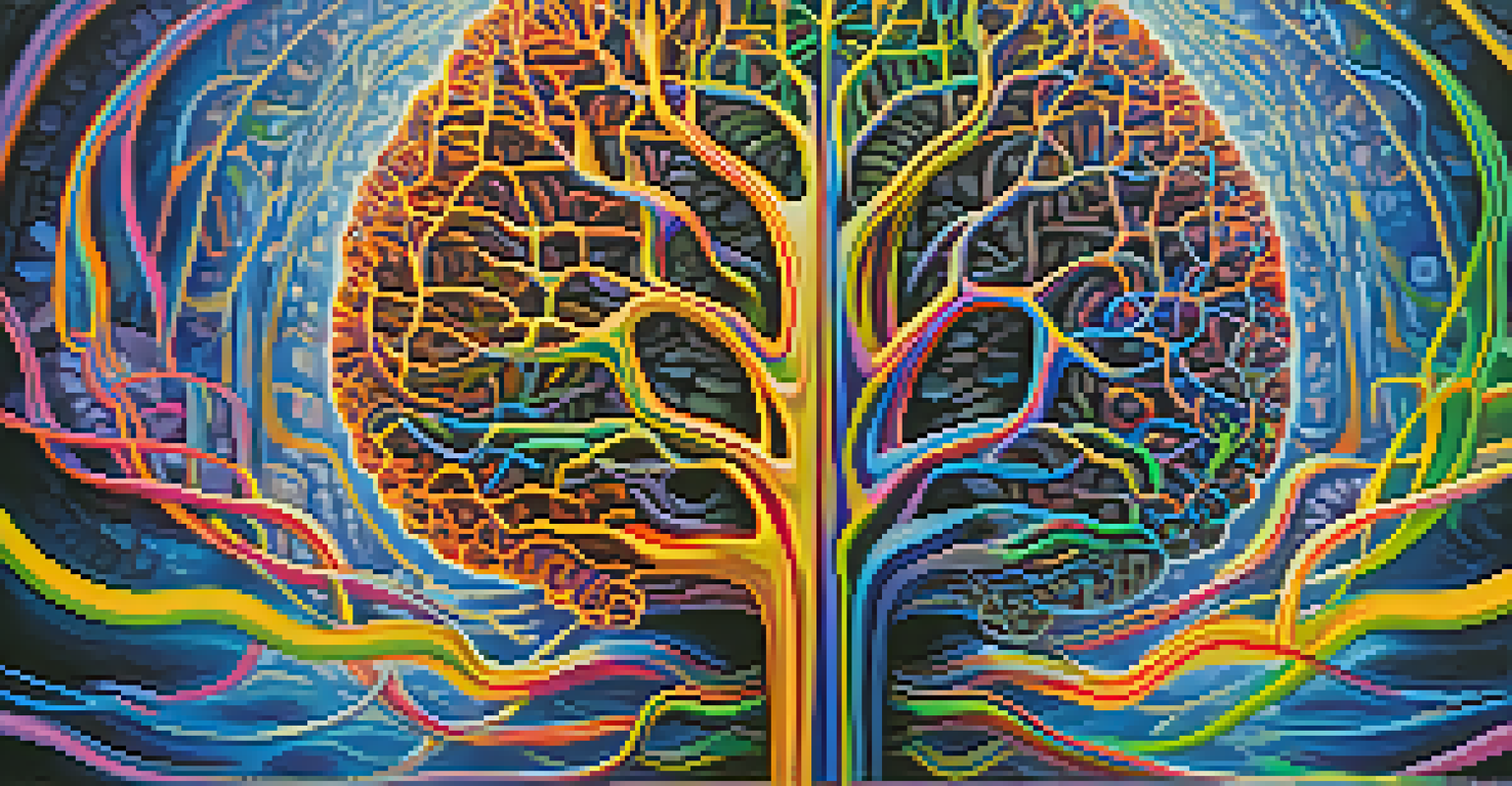Ayahuasca and the Neuroscience of Consciousness Expansion

Understanding Ayahuasca: A Brief Overview
Ayahuasca is a traditional Amazonian brew made from the Banisteriopsis caapi vine and other plants, often used in spiritual ceremonies. Known for its psychoactive properties, it has gained popularity worldwide as a means of exploring consciousness. The brew contains DMT (dimethyltryptamine), a powerful psychedelic compound that alters perception and thought processes when ingested.
The experience of Ayahuasca has the potential to reveal profound insights into our lives and our connections to the universe.
Indigenous cultures have utilized Ayahuasca for centuries, believing it connects them with spiritual realms and enhances self-awareness. Today, it attracts those seeking healing, personal growth, or a deeper understanding of themselves and the universe. This growing interest has led to scientific inquiries into how Ayahuasca might affect our brains and consciousness.
As we delve deeper into this topic, we'll examine the intersection of Ayahuasca use, neuroscience, and the potential for consciousness expansion. This exploration reveals not only the brew's cultural significance but also its implications for modern science and mental health.
The Brain on Ayahuasca: What Happens?
When Ayahuasca is consumed, the brain undergoes significant changes that influence perception and cognition. Research indicates that the brew activates areas associated with emotional processing, introspection, and self-awareness. This heightened activity can lead to profound insights and a sense of interconnectedness with the world.

One of the most intriguing effects of Ayahuasca is its ability to alter neural pathways. Studies suggest that it encourages neuroplasticity, allowing the brain to form new connections and potentially heal from trauma. This process can help individuals break free from negative thought patterns and emotional blockages.
Ayahuasca's Transformative Effects
Ayahuasca can facilitate profound insights and emotional healing by altering brain activity and promoting neuroplasticity.
The experience is often described as a journey of the mind, where users may confront past traumas and gain clarity about their lives. This therapeutic potential has led to increased interest among mental health professionals and researchers, who are eager to understand how these effects can be harnessed for healing.
Psychedelics and the Default Mode Network
The Default Mode Network (DMN) is a network of brain regions that is active when we are at rest and engaged in self-referential thoughts. It's often linked to our sense of self, daydreaming, and mind-wandering. Psychedelics like Ayahuasca are known to temporarily disrupt the DMN, leading to a dissolution of ego and enhanced feelings of connectivity.
Psychedelics can open doors to new perspectives and understandings of the self and the world around us.
This disruption can create a sensation of being part of something larger than oneself, fostering empathy and compassion. Users often report feeling a deep connection to nature, others, and even the universe. This shift in perspective can be transformative, encouraging a sense of unity and understanding.
Research indicates that this altered state can have lasting effects on an individual's outlook on life, promoting positive changes in behavior and emotional well-being. By studying how Ayahuasca affects the DMN, scientists hope to uncover new pathways for treating mental health disorders.
The Role of Set and Setting in Ayahuasca Experiences
Set and setting refer to the mindset of the individual and the physical environment in which the Ayahuasca experience occurs. Both play a crucial role in shaping the outcomes of the journey. A supportive and safe environment can enhance positive experiences, while a negative setting can lead to distressing trips.
Many traditional Ayahuasca ceremonies are conducted in a ceremonial space with experienced guides, which helps foster a sense of safety and support. This guidance allows participants to navigate challenging emotions and experiences that may arise during the journey. The communal aspect can also enhance feelings of connection and shared understanding.
Cultural Importance of Ayahuasca
The brew is rooted in Amazonian traditions, serving as a bridge between the physical and spiritual realms, while raising discussions on cultural respect.
Understanding the importance of set and setting is vital for anyone considering Ayahuasca. By creating a conducive environment and mindset, participants can maximize the potential benefits of their experience, leading to greater insights and healing.
Ayahuasca and Mental Health: A Therapeutic Perspective
The therapeutic potential of Ayahuasca is garnering attention in mental health circles. Preliminary studies suggest that it may help alleviate symptoms of depression, anxiety, and PTSD. The brew's ability to facilitate deep emotional processing and introspection can provide individuals with new perspectives on their struggles.
In therapeutic settings, Ayahuasca is often administered under the supervision of trained professionals who guide participants through their journey. This approach not only enhances safety but also encourages meaningful integration of insights gained during the experience. Integration is crucial for translating the lessons learned into everyday life.
While more research is needed to fully understand the long-term effects and efficacy of Ayahuasca as a treatment, initial findings are promising. As society continues to explore alternative therapies, Ayahuasca stands out as a potential tool for healing and personal growth.
The Science Behind Consciousness Expansion
Consciousness expansion refers to the phenomenon of experiencing heightened awareness and altered perceptions of reality. This state can lead to profound insights and a deeper understanding of oneself. Ayahuasca, with its unique chemical composition, has been shown to facilitate such experiences, pushing the boundaries of ordinary consciousness.
Studies have revealed that psychedelics like Ayahuasca can induce alterations in brain connectivity, leading to new ways of thinking and perceiving the world. These changes can manifest as increased creativity, enhanced problem-solving abilities, and a broader perspective on life. Many users report feeling more open-minded and empathetic after their experiences.
Psychedelics and Mental Health
Research suggests that Ayahuasca may help alleviate mental health issues like depression and PTSD, highlighting its therapeutic potential.
By examining the neuroscience behind these phenomena, researchers aim to unlock the secrets of consciousness itself. The potential for psychedelics to expand our understanding of the mind may reshape not only mental health treatment but also our fundamental understanding of human consciousness.
Ayahuasca's Cultural Significance and Global Impact
Ayahuasca is deeply rooted in the cultural practices of Amazonian tribes, where it serves as a bridge between the physical and spiritual realms. Traditionally, it is used in rituals aimed at healing, divination, and spiritual awakening. The brew's sacred status has attracted attention from people worldwide, leading to a growing interest in its cultural significance.
As more individuals seek out Ayahuasca experiences, there's a growing dialogue about cultural appropriation and respect for indigenous practices. It's essential for participants to approach these experiences with reverence and understanding of their origins. Supporting local communities and participating in ethical tourism can help preserve these traditions.

The global impact of Ayahuasca extends beyond personal transformation—it's sparking conversations about mental health, spirituality, and the nature of consciousness itself. As society embraces these discussions, we may find new pathways toward healing and understanding our place in the world.